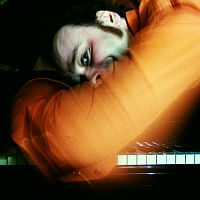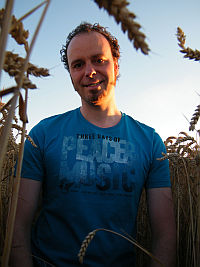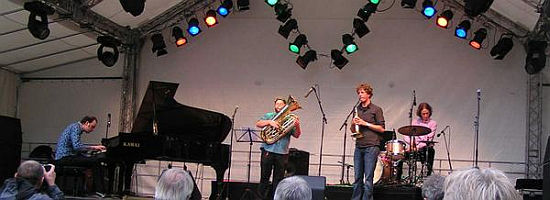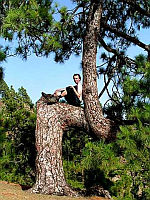Marc Brenken (born June 17th, 1973 in Wilhelmshaven) early discovered his love for music and nature. He grew up in a rural part of Schleswig-Holstein (Northern Germany), where he used to explore the surroundings of his home village Tetenhusen by bicycle, often for hours and even when the wheater was nasty. His mother used to sing and play a lot on her grand piano, which Marc became more and more attracted to. When he was eight years old, he got the first piano lessons, but the usual way of learning etudes and patterns quickly bored him. Luckily his father had a collection of jazz records, so Marc tried to copy recordings of Erroll Garner and Oscar Peterson on the piano at the age of twelve. From that time on he learnend more efficiently and also started to play in school bands.
In 1994 he moved to Essen to study jazz piano at Folkwang University of the Arts. He also attended masterclasses with Kenny Werner, Fred Hersch, Richie Beirach, Marc Copland and John Taylor.
Aside from his excitement about the manifold tradition of jazz piano it was always important for Marc to do his own thing musically. This attitude results in his compositions, where he transforms personal experiences, moods or natural phenomenons into music.
His playing is characterised by a strong sense for melodies, great dynamic, risk-proclivity and tactfulness. For Marc passion, diversity of sounds and deliberate dramaturgy are very important aspects in making music. „You have to feel what you play, if you want to transmit something to yourself and to the audience“.
In 2006 his debut CD Eight Short Stories was released. Marc composed all the pieces for this album.
2009 a trio album, It Could Happen to You, followed, featuring Alex Morsey on double-bass and Marcus Rieck on drums. In 2012 Starting Our Journey was relased, the debut of the Marc Brenken - Jean-Yves Braun Quartet. 2014 More Short Stories followed, featuring again the quartet with Christian Kappe. All albums have been released on his label marc brenken music.
Concert tours have taken him a. o. to Romania, the Netherlands, Spain, Norway, Lebanon and Mongolia. Furthermore he is also featured on CD releases of the Literaturkommission für Westfalen (jazz & poetry projects).
In 2010 the Marc Brenken Trio was semi-finalist of the New German Jazz Award, in December 2011 the Marc Brenken - Christian Kappe Quartet was voted the winner of the First Jazz Prize Ruhr by the audience after having been pre-selected by an international jury of jazz experts.
%20als%20Kind%20200x200%20color.jpg)
%209%20(photo%20by%20Thomas%20Zeggel)%20200x324.jpg)


Seven Questions & Answers with Marc Brenken
How did you start playing the piano?
I grew up in a village in Schleswig-Holstein, where it was not very common to actively make music, aside from the band of the local auxiliary fire brigade. However, sometimes, my mother used to play the piano - we had an old grand in our home. When I was eight, I got the first classical piano lessons, but I was not very much into the conventional pieces and exercises from the manuals. I took a break of one or two years, just to realize after a while that I still wanted to play the music by ear that I heard on the radio. I recorded my favorite pieces on cassette, and kept on listening to the parts I was interested in, until I knew exactly what was going on there musically. This was great fun for me, even though sometimes I had to puzzle about it for hours. Thus, I learned a lot about music – and today, I still work like that basically. My father did not play an instrument, yet he had many jazz records. The ones I liked best where the recordings by Erroll Garner, Oscar Peterson and George Shearing - this was the beginning of my love with jazz.
So you learned most about music by listening?
Absolutely! From the beginning, I just wanted to know the structure of music; therefore I had to intensively concentrate on the “vocabulary” and the “grammar”. With the new knowledge, I tried out a lot on the piano. That means I “played” in the very sense of the word.
What is your fascination about music?
Music is emotion; music can convey emotion and create it. Happiness and exuberance, yet also sadness and melancholy. It is just beautiful to express one’s own feelings on an instrument. For me, this is at the core of my making music. Furthermore, music means freedom for me, and this freedom I mainly find in jazz.
How do you compose?
Musical ideas are permanently on my mind. Every once in a while, I capture them by recording or writing them down; and then I just collect these sketches. When an idea attracts me I try to develop it further – mainly on the piano. Sometimes I also try other instruments to get new ideas. As soon as I have fixed the rough form, I bring the new piece along to a band rehearsal, go through it with the other musicians and make a test recording. Some compositions are coherent from the very beginning, yet often we need to work out the details. It also occurs that I discard ideas. It is important to keep on trying, to break rules and conventions, and to stay open for surprises. The moments that are particularly fascinating often evolve when you do not make rigid plans, but when spontaneous emotion of the musician is given space to unfold.
Are there musicians that you look up to?
Certainly – there are many actually. Among composers I admire, above all, Wayne Shorter, Igor Strawinsky, Tholonious Monk, Herbie Hancock, John Taylor, Kenny Werner, John Scofield and the team of Pat Metheny – Lyle Mays. The great jazz pianists clearly had a strong influence on me: Keith Jarrett, Brad Mehldau and my earlier icons Oscar Peterson and Erroll Garner – not to neglect Bill Evans, George Shearing, Wynton Kelly and the late Dave McKenna, who died in 2008 and is definitely too little known. But every now and then, I also listen to pop and rock music, for instance to Van Halen, The Police, Red Hot Chili Peppers or some of Björk’s and AC/DC’s stuff. Music of all styles has always inspired me. And even noises can be fascinating, too. When I compose or make music, atmosphere and timbres are of utmost importance.
What do you enjoy doing besides music?
I am a person very close to nature, I often ride my bike, go jogging in the woods or swimming in a lake. I love the high mountains; in the summer I often go hiking in the Alps. I have a weakness for good food. And I like photography. In winter, I often read and go to the sauna.
What are your wishes for your future?
Health, peace, playing many fine concerts, recording music worth listening to, and still having the time to enjoy life!

